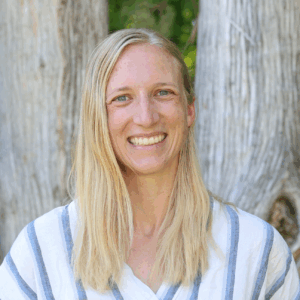Clinical Expertise in Every Setting
Mountain Valley’s Clinical Director, Alison LaFollette, PhD, traded testing in the deserts of Utah to directing a clinical team in the woods of New Hampshire. She arrived on campus a little over a year ago and works alongside an excellent team of clinicians and staff to further the development of the clinical program. Before she made the big move, Alison spent 10 years in Utah, primarily focusing on comprehensive psychological and neuropsychological evaluations with adolescents and young adults.

What brought you to Mountain Valley?
“In my training I specialized in working with anxiety and depression in young adults. During my master’s program I worked at a career counseling center, and in my PhD program I worked in community mental health and a university counseling center. For my postdoctoral work, I was at a psychiatric inpatient hospital treating acute cases of anxiety, depression, mood disorders. After that, I taught for two years at a liberal arts college in Salt Lake City, teaching master’s level clinicians in the mental health counseling program. I left that position to begin my work in comprehensive evaluations at wilderness therapy programs, therapeutic boarding schools, and residential treatment centers.
All that experience gave me a lens for examining complex cases with many co-occurring disorders. You need to think critically and carefully about clients and what would be in their best clinical interest over time. I think that experience applies well to Mountain Valley. While we primarily treat OCD and anxiety, often that’s not the only thing happening for the clients coming in. They might have co-occurring depression, trauma, or be on the autism spectrum. The various experiences I have had help me think about the clients that come to Mountain Valley in a unique way. I can apply that experience in different evidence-based treatments in a variety of ways with our clients.”
What do you like best about working at Mountain Valley?
The residents that come to the program. We have some really interesting conversations together in therapy, but also just casually in the community. Most of the residents who come to Mountain Valley are working hard to figure out how to improve their functioning in a variety of ways, and they have a nice openness to different techniques. I think that’s a fun part of the job—while our program is heavily influenced by exposure response prevention (ERP) we also dabble in different evidence-based practices, like cognitive behavioral therapy, and residents get to find different things that resonate with them.
Watching residents apply their new skills or have meaningful exposure experiences in real-time is definitely the best part of the job. A lot of times in outpatient therapy, because of the limited timeframe, you don’t always get to see that change happening right before your eyes. But at Mountain Valley, you get to see that change from the time of their intake to when they graduate.
What is a typical day like for you?
A typical day is quite busy. In my role as clinical director, it means that I’m spending a lot of my day trying to support the therapists that are on my clinical team. That might be thinking about their case and how to proceed with it or engaging in case conceptualization. I coordinate with the residential director and meet with the executive director to determine how to improve our clinical programming. Sometimes I’m in therapy groups during the day with the clinicians, and generally I’m checking on the overall health of the residents that are in our care.
What do you think is the biggest misconception around OCD?
I think when a lot of people use the word OCD, they use it in a very casual way to describe being organized or liking things clean or wanting to do things in a specific way. It’s not that those things can’t be OCD, but when its’s talked about in the mainstream it often doesn’t take the diagnosis seriously. The level of OCD a person has can really impact everything from getting up in the morning to their relationships.
Another misconception that OCD is very visible, but often it’s not. A lot of times the compulsions are happening mentally, and that can make it hard to recognize. It might look like someone is trying to control things, and when they’re told to let go, that’s the thing they’re fearing the most. You have to target it in a specific way to help them realize what happens when they step outside of things that are in their control.
What’s your goal for a resident when they graduate from the program?
In my mind, it is an improvement in functioning and living in accordance with their values. Sometimes the resident can function to a degree and it’s only because of the way that they’re engaging with their OCD. It’s not really in line with their values. They can’t have the meaningful relationships they want, or pursue academics in the way that they want, or go about the day in a healthy way. My hope is that when they leave our care that they’ve learned enough skills and gone through enough exposure work that they can tolerate distress and move toward their goals.
What’s been the biggest surprise about moving to the East Coast?
Coming from Utah, the proximity to bodies of water. In Utah there’s the Great Salt Lake, which is large, but you can’t really use it for recreation. It’s been fun to be in the East where we’re close to rivers, swimming holes, lakes, and the ocean. That’s been a nice surprise and not something I really thought about when moving out here. It’s been fun to add that into the outdoor activities I enjoy.


